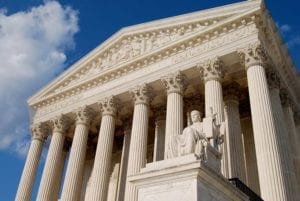 On December 18, 2019, the Supreme Court granted the city of Chicago’s petition to determine whether the “automatic stay” imposed by the Bankruptcy Code requires creditors to turn over property belonging to a debtor that they have repossessed as soon as the debtor files for bankruptcy. The case arises out of four separate bankruptcy cases out of Illinois, where the city of Chicago impounded the respondents’ cars based on the respondents’ failure to pay traffic fines and then refused to return the cars after the respondents filed for bankruptcy.
On December 18, 2019, the Supreme Court granted the city of Chicago’s petition to determine whether the “automatic stay” imposed by the Bankruptcy Code requires creditors to turn over property belonging to a debtor that they have repossessed as soon as the debtor files for bankruptcy. The case arises out of four separate bankruptcy cases out of Illinois, where the city of Chicago impounded the respondents’ cars based on the respondents’ failure to pay traffic fines and then refused to return the cars after the respondents filed for bankruptcy.
The Petitioners framed their question to the Court as: “Whether an entity that is passively retaining possession of property in which a bankruptcy estate has an interest has an affirmative obligation under the Bankruptcy Code’s automatic stay, 11 U.S.C § 362, to return that property to the debtor or trustee immediately upon the filing of the bankruptcy petition.”
Under the Bankruptcy Code, 11 U.S.C. § 541(a)(1), the filing of a bankruptcy petition creates a bankruptcy estate that contains all of the debtor’s legal and equitable interests in property. Section 362(a) of the Bankruptcy Code provides that upon the filing of the bankruptcy petition, creditors are enjoined from certain actions to collect debts owed by the debtor, including actions to take possession or exercise control over property of the bankruptcy estate. This is commonly referred to as the “automatic stay” because no court order is required to create the stay, but instead it becomes effective upon the filing of the bankruptcy petition. A separate provision, Section 542, requires any entity possessing estate property that can be used, sold, or leased by the trustee to be turned over to the trustee.
As the City argued in its petition, the turnover provision of the Code is not automatic, and a trustee must file an adversary proceeding to compel the turnover of property from a creditor who has possession. In this scenario, creditors who have lawfully repossessed collateral are able to assert defenses to turnover and assert their rights to adequate protection of their interest in the property at issue. What has divided the courts of appeal is whether the automatic stay provision of the Code operates to make the turnover provision of the Bankruptcy Code automatic upon filing of the bankruptcy petition. If so, this scheme fails to provide creditors with the opportunity to assert affirmative defenses and protect their rights in the seized collateral.
While some Circuits such as the Second, Seventh, Eighth, Ninth and Eleventh Circuits have held that creditors’ passive retention of repossessed cars or other property in which the estate has an ownership interest violates the automatic stay. Others, like the Tenth and D.C. Circuits have found that passive retention of debtors’ property does not rise to the level of “exerting control” over estate property to violate the automatic stay provisions of the Bankruptcy Code. This appeal seeks to resolve the differences among the Circuits and determine which reading of the Bankruptcy Code is correct and whether creditors who have rightfully seized collateral are in violation of the automatic stay by retaining passive possession of the property upon the filing of a debtor’s bankruptcy petition.
SCOTUS Blog: City of Chicago, Illinois v. Fulton
SCOTUS Blog: City of Chicago, Illinois v. Fulton
Photo Credit: Christina B Castro
